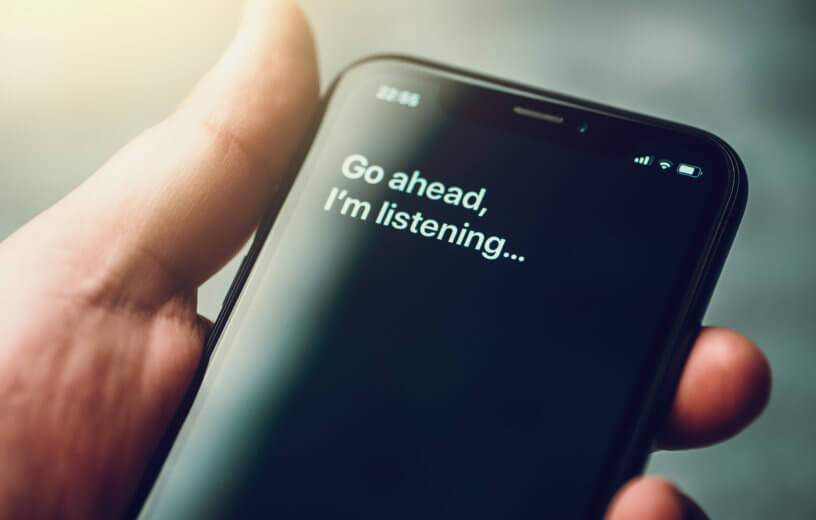
BALTIMORE, Md. — Do you ever get the creepy feeling you’re being watched? According to two computer scientists, you’re probably right, only it’s not someone watching you, it’s something — and that thing is smart technology.
In a paper by University of Maryland, Baltimore County’s Roberto Yus and Penn State’s Primal Pappachan, the team warns that billions of digital devices are scanning and sensing your movements every day. Some of them are sitting right in front of you — inside televisions, cars, offices, and even your refrigerator.
In 2007, few people could have imagined the countless apps which society now uses on their smartphones each day. However, Yus and Pappachan say this technological revolution has come with a high price to our privacy as internet connectivity now reaches people in more places than ever before.
For all these smart devices to do their job, they need a connection to the internet so they can correlate all the data they’re gathering on you. For example, a smart thermostat in your house spends its day collecting information on you and your preferences. However, without an internet connection to see a weather forecast, the thermostat can’t decide how to properly set the temperature in your home.
This is just the tip of the iceberg though, as the researchers say devices which gather data on everything people do are infiltrating our workspaces, malls, and cities.
“In fact, the Internet of Things (IoT) is already widely used in transport and logistics, agriculture and farming, and industry automation. There were around 22 billion internet-connected devices in use around the world in 2018, and the number is projected to grow to over 50 billion by 2030,” the team explains in an article published in The Conversation.
The problem of privacy
So, what are all these smart devices doing? A lot depends on what the device does. Smart security cameras and home assistants like Alexa are basically just cameras and microphones which record you and your activities all day.
While these examples may seem obvious, it might surprise you to know that smart TVs can do the same exact thing. Meanwhile, smart lightbulbs monitor your sleep and heart rate, and smart vacuum cleaners actually map out the interior of your home as it recognizes objects to avoid hitting.
While some products market these features, and others claim that your data will not end up in the hands of other people, the team says this isn’t always true.
“Manufacturers typically promise that only automated decision-making systems and not humans see your data. But this isn’t always the case. For example, Amazon workers listen to some conversations with Alexa, transcribe them and annotate them, before feeding them into automated decision-making systems,” Yus and Pappachan explain.
Even if you limit the amount of data and access your devices handle, the researchers say their connection to the internet can still leave you vulnerable. Any private data shared over the internet can become the target of hackers. Moreover, the team warns that few consumer internet-connected devices are completely secure.
Making matters worse, many smart devices become virtually useless if you disconnect them from the internet. Additionally, you don’t even have the option to choose privacy over connectivity when it comes to the devices in a public place such as an office or mall.
Will the law protect your privacy?
Although governments worldwide are taking steps to protect the privacy of its citizens, the authors say the enforcement of these rules is still playing catch-up with the ever-growing number of internet-connected devices out there.
“If you own a smart device, you can take steps to secure it and minimize risks to your privacy,” Yus and Pappachan say. “Two key steps are updating the device’s firmware regularly and going through its settings and disabling any data collection that is not related to what you want the device to do.”
The team also recommends that anyone looking to buy a smart device first find out what data it collects and what the manufacturer’s data management policies are according to an independent source.




Awe, don’t worry about your privacy, you have nothing to hide. If you really believe that, soon you will have nothing to hide or display.
Slap that tin hat on tighter
Why don’t you write a book? I’d read it! I deal with high tech crime all day and night. A cop and a private eye help. It is completely invasive and defies the logic of math, as we know it. REALLY PAINFUL and totally legal.
You’ll not believe it. I drive a garbage truck and dump commercial accounts. The other day i found a monitor hidden on the side of one (a wastewiser owl?) and after checking it out online, discovered they’d been recording everything about my schedule. Sheesh
Or they could have just put it there to determine when the containers were empty, Panicking Patty
Hmmm, “your” dumpster bug paid for and monitored by the customer, yes?
How ironic that I have to consent to let this website access my device storage in order to read this article.
Zelenskyy = Hero
Biden = Zero
You = Republican Nero
Maybe the environMENTAL activists have been right all along. We shoud all go back to living in caves and eating grass.
Zelenskyy is schitt.
I sat on a tech focus group in 2010. Tasked with building a profile of the occupants in a test “smart house “. With 90 days of data we were able to determine how long people stayed in the bathroom and whether they flushed, when the children applied makeup, and when the father DIDN’T use his CPAP while sleeping (good info for insurance Co). We really don’t have any privacy anymore. But I guess that all depends on one’s definition of privacy
I read about that a long time ago and now it is real but it does not impress me much.
We all lost our essence in name of being spectators of our fake lives
Maybe some people are learning some security. Webs that can not be used after I tighten browser security settings, become usable again in a few weeks. Some webs still fail in no part of google is allowed. I always block google web fonts to keep my IP address from google but few webs now require it.
Aurora store lets me use google play store sans account. I have no gmail account & only use G maps in browser. Phone normally spoofs GPS location.
Many are developing new ways to know us by spyphones, TVs, PCs & watches. It is just another arms race.
As smart devices become increasingly common in our homes and workplaces, concerns are growing about the potential for these devices to collect and transmit sensitive data, compromising our privacy and security. Computer scientists and privacy advocates have warned that many smart devices, such as smart speakers, security cameras, and home automation systems, are constantly listening, watching, and collecting data on their users, often without their knowledge or consent.
Indeed, the rise of smart devices has sparked concerns among computer scientists regarding the potential invasion of privacy. It’s crucial to stay vigilant and aware of the data these devices collect, as well as the ways in which they can potentially be misused. Protecting our privacy should be a priority in the digital age!